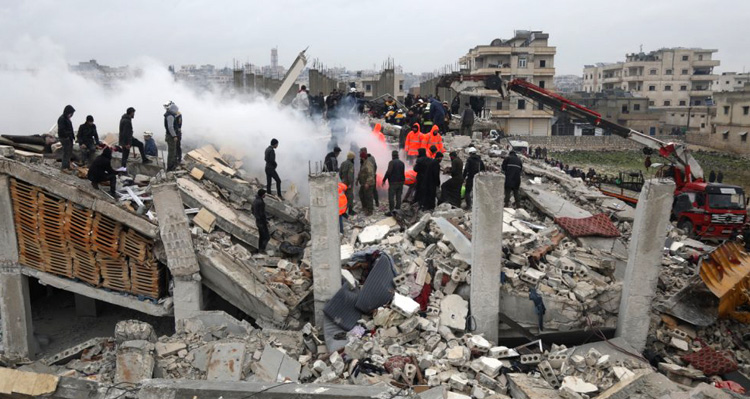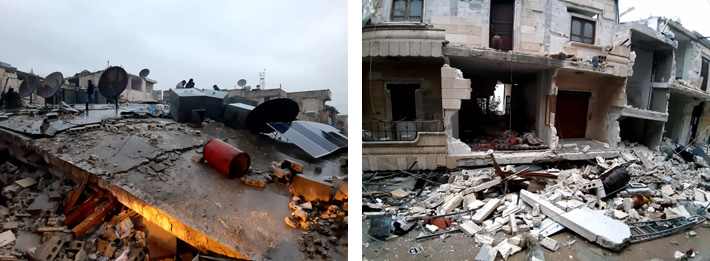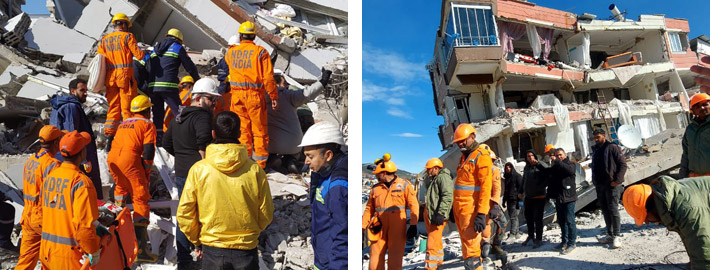INDIAN ARMED FORCES CHIEFS ON OUR RELENTLESS AND FOCUSED PUBLISHING EFFORTS

The insightful articles, inspiring narrations and analytical perspectives presented by the Editorial Team, establish an alluring connect with the reader. My compliments and best wishes to SP Guide Publications.

"Over the past 60 years, the growth of SP Guide Publications has mirrored the rising stature of Indian Navy. Its well-researched and informative magazines on Defence and Aerospace sector have served to shape an educated opinion of our military personnel, policy makers and the public alike. I wish SP's Publication team continued success, fair winds and following seas in all future endeavour!"

Since, its inception in 1964, SP Guide Publications has consistently demonstrated commitment to high-quality journalism in the aerospace and defence sectors, earning a well-deserved reputation as Asia's largest media house in this domain. I wish SP Guide Publications continued success in its pursuit of excellence.
A Turkish Tragedy
Death toll from the earthquake is expected to be very high as thousands of houses and aparment blocks have been reduced to rubble
 |
The Author is former Chief of Staff of a frontline Corps in the North East and a former helicopter pilot. He earlier headed the China & neighbourhood desk at the Defence Intelligence Agency. He retired in July 2020 and held the appointment of Addl DG Information Systems at Army HQ. |

The week started with a tragedy when a 7.8 magnitude earthquake struck south-western Turkey and adjoining north-western regions of Syria early morning on Monday. At least 15,000 people are feared dead as of Wednesday as a crucial 72 hours rescue window closes. Going by the fact that over 6,000 houses and apartment blocks have been reduced to rubble, it is feared that the death toll would be exponentially higher, perhaps topping 50,000. Worse, a severe wintry weather with sub-zero temperatures and rains are hampering rescue efforts and endangering survivors. Like when the COVID struck three years back, India has taken a demonstrated lead in reaching out with two NDRF teams and an Army Field Hospital ex Agra having flown out in four C-17 Globemasters with specially trained dog squads, drilling machines, relief material, medicines and other necessary utilities & equipment on Tuesday. As expected, other international aid have poured in to assist Turkey in this gargantuan task. Hope and prayers go hand in hand with a massive rescue effort that is testing human endurance to the hilt.
Unlike a surreal Greek tragedy which is a dramatic poem or play in formal language and in most cases has a tragic or unhappy ending, this one is real and catastrophic. The word “tragedy” itself comes from the Greek words ‘tragos’, which means goat and ‘oide’, which means song. And this time it has struck its immediate neighbour Turkey, just across the Bosporus with devastating effect. It is another matter that Turkey and Greece are sworn enemies even though both are part of the NATO. Slugfest over Cyprus continues to keep them at draggers drawn.

While the earthquake itself is tragic enough in terms of devastation and loss of lives, the tragedy has been compounded by many other factors, economic and geopolitical. This nature’s fury comes even while the ordinary Turkish population was already reeling under a runaway inflation hitting 85 per cent in November 2022. The currency, the Turkish Lira had depreciated by over 44 per cent in 2021 alone. The crisis has been caused by the Turkish economy's excessive current account deficit and large amounts of private foreign-currency denominated debt, in combination with President Erdogan’s increasing authoritarianism. In power since 2002, Erdogan has been suspicious of western style capitalism since the 2008 financial crisis triggered by the collapse of Lehman Brothers. Following the 2016 coup attempt which Erdogan blames on the US based Muslim cleric Fethullah Gulen, his government seized the assets of those it suspected were involved, even if their ties to the coup were tenuous. Erdogan has not taken seriously concerns that foreign companies investing in Turkey might be deterred by such actions.
So, even though Turkey has the second largest military within the NATO after the US, it has a testy relationship with many of its members, including of course, its traditional enemy Greece. It houses roughly 4 million refugees since the influx stated over a decade ago in the footsteps of the failed Arab Spring in 2010 that started from Tunisia, and then spread to five other countries: Libya, Egypt, Yemen, Syria and Bahrain. Many long-serving rulers were deposed viz, Zine El Abidine Ben Ali, Muammar Gaddafi, Hosni Mubarak, Ali Abdullah Saleh. Syria’s Bashar al-Assad survived, thanks mainly to decisive support from Russia. Syrians alone account for 3.7 million refugees in Turkey. President Erdogan has threatened the EU multiple times to release these teaming millions into the Eurozone which is already reeling under the after-effects of its liberal refugee policies.

Turkey is holding up the process to assimilate Sweden and Finland into the NATO in wake of the Ukraine war. There are significant Turkiye rebels groups in Sweden and Erdogan has found it convenient to arm-twist Sweden to come down hard on them just when it is lined up for the NATO membership. It has also been largely ignoring to implement the harsh western imposed sanctions on Russia post the outbreak of war in Ukraine. Erdogan enjoys the confidence of President Putin and their strategic partnership is cemented with the deployment of S-400 air defence missile system despite stiff opposition from the United States. Sitting astride the Bosporus that connect the Black Sea with the Agean Sea, it is key to Russia’s strategic outreach. Since the outbreak of Ukraine war and despite western sanctions, Turkey’s oil imports from Russia have more than doubled.
Of greater interest to the readers is Turkey’s relationship with India. In contemporary times, relations between India and Turkey have been strained due to Turkey's religious mutuality with Pakistan. Until recently, Turkey was a vocal advocate of Pakistan's position on the Kashmir dispute. Turkey was also one of the few opponents to India's inclusion into the Nuclear Suppliers Group. In 2019, the Pakistan PM Imran Khan announced a special partnership with Turkey and Malaysia with clear anti-India overtones. This offended Pakistan’s traditional backer Saudi Arabia so much that Prince Md Bin Salim (MBS) recalled mid-air the private jet that he had lend to fly Imran back from the US. Despite these serious differences, the prompt decision to fly out rescue and relief material and personnel is testimony to India’s astute diplomatic craftmanship.
On the Syrian side, some of the areas most impacted by the earthquake are controlled by the President Bashar al-Assad's government, others by Turkish-backed and US-backed opposition forces, Kurdish rebels and Sunni Islamist fighters. This has made rescue and relief that much challenging. International aid and even assistance from the Syrian state has been less enthusiastic. It is feared that Syrian victims may become hostages of the politics that have divided Syria for over a decade. In wake of the earthquake, Syria's government has ramped up its calls for the removal of economic US and EU sanctions imposed on Syria to pressure the regime into a political process that could put an end to the ongoing civil conflict. There is a dire need for all parties to shun politics and come together in this hour of grief. This is also a time for statesmen to imagine a more peaceful and just world and work to bring people together.
As former Stanford economist Paul Roemer had famously said, “A crisis is a terrible thing to waste”.





